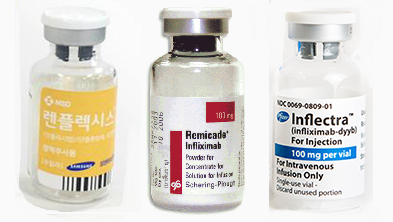Samsung Bioepis said Tuesday it would launch Johnson & Johnson’s Remicade biosimilar Renflexis (infliximab-adba) in the United States, a decision made possible by the Supreme Court’s ruling last month.
On July 12, the highest U.S. court clarified the working mechanism of the so-called patent dance, formally known as the Biologic Price Competition and Innovation Act (BPCIA), a legal mechanism used to settle patent disputes among biologic producers.
The Sandoz Inc. vs. Amgen Inc. ruling overturned critical components of the BPCIA. The U.S. Congress passed the act in 2009 to facilitate patent disputes between biologic and biosimilar companies.
The BPCIA treats “the mere submission of a biosimilar product” to the FDA as an act of “artificial infringement.” Therefore, upon FDA submission, the biosimilar and originator product manufacturers engage in two rounds of patent litigations to settle disputes before the biosimilar product hits the market.
The Sandoz vs. Amgen dispute began when Sandoz, a biosimilar maker, effectively refused to follow two BPCIA provisions. The court decided on two critical provisions of a statute that required the biosimilar company to, upon FDA submission, hand over its FDA application and manufacturing information to the original manufacturer, and to give an 180-day notice to the latter upon receiving FDA approval.
At the end of the dispute, the court stated that no federal injunctions exist to enforce either provision. It allowed biosimilar companies to give the 180-day notice before receiving an FDA approval, effectively eliminating the six-month wait for biosimilar companies.
Although the ruling has left experts divided over its implications, biosimilar companies are now heading into the U.S. biologic market at full speed, unhindered by the six-month wait period following FDA approval.
Samsung has used the ruling to its advantage, announcing its product launch although it is involved in a patent litigation with Johnson & Johnson over Remicade patents.
Infliximab market will see intensified competition with Samsung’s Renflexis

Samsung Bioepis and Johnson & Johnson have been going head-to-head in patent litigations, with the latter claiming Samsung infringed on its patents. Industry experts have viewed the move as one employed by J&J to delay the entry of Renflexis into the market.
Samsung's accession to the U.S. market has raised the heat considerably as the company announced the list price of Renflexis at 35 percent lower than Remicade’s. Celltrion’s biosimilar Remsima (known as Inflectra in the U.S.) is another contender already in the market that has, despite having engaged in the patent dance, reached the U.S. market faster.
The entry point into the U.S. market has shown to be critical for sales. Although the recent BPCIA ruling has given Samsung a considerable advantage, Celltrion’s early advancement into the market has given it a head start.
Figures show that Celltrion sold about $17 million worth in the U.S. from November to March as the first-mover. According to Pfizer which markets and sells Remsima in the U.S. and Europe, Remsima sales in the U.S. amounted to $78 million, out of its global biosimilar sales of $105 million in the first quarter
Korean biosimilar companies hit the global stage
Two domestic biosimilar companies, Celltrion and Samsung Bioepis, have been asserting its presence in the global sphere with their biosimilar products.
Celltrion has 11 products biosimilar in its pipeline, and gained approval for Remsima, with FDA applications underway for Truxima in the U.S. and EMA applications underway for Herzuma.
Samsung Bioepis has 13 products in its pipeline and has announced the recent launch of Renflexis in the U.S.
Korea’s biosimilar market is expected to grow to around $130 million by 2019, doubling its value from 2013. As the government is looking toward the healthcare industry to serve as the next growth engine, Korea has currently approved six biosimilars with dozens of others in the development pipeline.
The global biosimilar market has also shown no signs of slowing down, with the market expected to grow at a compound average growth rate of around 25 percent from 2017 to 2023. In 2016, the world market surpassed $3.3 billion in 2016 and is projected to exceed $10.5 billion by 2023.
Although industry insiders are still speculating as to who will emerge as the infliximab market leader with Samsung in the mix, ongoing patent disputes are gathering more attention as its significance directly impacts both original and biosimilar product manufacturers in the rapidly growing biologic product market.
The U.S. Supreme Court allowed Amgen to seek possible settlements through state laws, particularly California law, leaving the BPCIA fight at a standstill. Since the case has been deferred to the court of appeals, there is still a possibility of the case going back to the Supreme Court.
With the biologic market either joining in the patent dance or choosing to sit it out, industry experts are watching closely for further developments that will change the patent and the healthcare industry.

